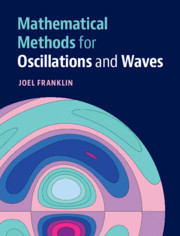
-
Select format
-
- Publisher:
- Cambridge University Press
- Publication date:
- April 2020
- March 2020
- ISBN:
- 9781108769228
- 9781108488228
- Dimensions:
- (246 x 189 mm)
- Weight & Pages:
- 0.75kg, 272 Pages
- Dimensions:
- Weight & Pages:
You may already have access via personal or institutional login
Book description
Anchored in simple and familiar physics problems, the author provides a focused introduction to mathematical methods in a narrative driven and structured manner. Ordinary and partial differential equation solving, linear algebra, vector calculus, complex variables and numerical methods are all introduced and bear relevance to a wide range of physical problems. Expanded and novel applications of these methods highlight their utility in less familiar areas, and advertise those areas that will become more important as students continue. This highlights both the utility of each method in progressing with problems of increasing complexity while also allowing students to see how a simplified problem becomes 're-complexified'. Advanced topics include nonlinear partial differential equations, and relativistic and quantum mechanical variants of problems like the harmonic oscillator. Physics, mathematics and engineering students will find 300 problems treated in a sophisticated manner. The insights emerging from Franklin's treatment make it a valuable teaching resource.
Reviews
‘In this book Franklin (Reed College) presents a lively, efficient introduction to the mathematical methods of the harmonic oscillator and wave equations. The study of the mathematical methods is motivated by diverse but related physical problems. The level of this presentation is suitable for sophomore college-level students of physics and mathematics … Over 80 graphs support the narrative and enhance its accessibility. The approximately 300 exercises are interesting, frequently challenging, and serve to reinforce the discussion.’
D. P. Turner Source: Choice
Contents
Metrics
Full text views
Full text views help Loading metrics...
Loading metrics...
* Views captured on Cambridge Core between #date#. This data will be updated every 24 hours.
Usage data cannot currently be displayed.
Accessibility standard: Unknown
Why this information is here
This section outlines the accessibility features of this content - including support for screen readers, full keyboard navigation and high-contrast display options. This may not be relevant for you.
Accessibility Information
Accessibility compliance for the PDF of this book is currently unknown and may be updated in the future.


